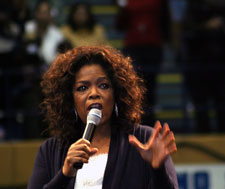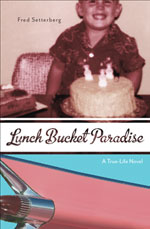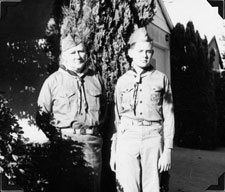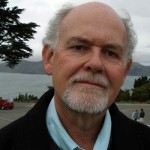By Fred Setterberg
How Fear of Oprah Turned My Memoir into Something Else
Sure, I used to fantasize about Oprah picking my latest book to discuss on her show. I had big dreams for Lunch Bucket Paradise, a story that bears more than a passing resemblance to my childhood and adolescence during the ‘50s and ‘60s. Heyday, a small press in Berkeley, California, published the book in late 2011.
 But when the editors and I first discussed how to categorize Lunch Bucket Paradise, broaching that all-important question of where it might be shelved in bookstores, I got nervous.
But when the editors and I first discussed how to categorize Lunch Bucket Paradise, broaching that all-important question of where it might be shelved in bookstores, I got nervous.
I imagined the worst: The studio lights bear down, the camera pans to my crumbling smile and shifty gaze, and Oprah leans into me—hard—with the James Frey treatment.
This didn’t really happen, did it?
A long procession of family and friends trail out from the green room, each testifying about my recklessness with the truth, my mendacity. All lies, damn lies. All exaggeration and outright fabrication. Oprah points a righteous finger, drilling directly through my memoirist’s pretentions, my weasel words.
Admit it, Fred! It’s fiction!
We didn’t call Lunch Bucket Paradise a memoir. My Oprah fears weren’t the only reason, of course, but they illustrate the current prickly debate among writers and readers about the nature of truth when something is labeled ”memoir.” In the spirit of full disclosure and in flight from the increasingly tarnished reputations of memoirists, Heyday and I settled on Lunch Bucket Paradise: A True-Life Novel.
But “true-life novel” raises other questions. How do I explain the unnamed first-person narrator? What about those period snapshots separating the chapters? (A brother and sister spiffed up for their First Communion. A man in overalls puttering away in his postage-stamp-sized backyard. A garage band in silver sparkly jackets pumping out the latest tune by James Brown and his Famous Flames.) I had deftly changed the name of my neighborhood from Washington Manor to Jefferson Manor, but surely this didn’t constitute an Olympian leap of the imagination.
 At this point, I’m not sure I can identify every place where truth ends and invention begins. What I do know is that labels like “memoir” and “novel” undermined my story as I was writing it, throwing a number of roadblocks into my path. In many ways, “true-life novel” is a testament to the long journey this book has undergone.
At this point, I’m not sure I can identify every place where truth ends and invention begins. What I do know is that labels like “memoir” and “novel” undermined my story as I was writing it, throwing a number of roadblocks into my path. In many ways, “true-life novel” is a testament to the long journey this book has undergone.
For years, I had longed to evoke the blue-sky promise of California’s working-class suburbia. I wanted to write about the ordinary men and women I’d grown up among, who had been battered by the Depression, bloodied by World War II, and then, in the age of Eisenhower, suddenly found themselves to be—astonishingly!—property owners. From where we stand today, it seemed a necessary recollection, a near-mythic moment of promises made and squandered.
Given the late-‘90s fashion in publishing, I made my first pass in the form of a memoir. I interviewed family members and conducted archival research just as I had previously done with several nonfiction books. I attempted to hammer my personal experience into a tale of suburbia’s founding years that would prove funny, moving, and authentic.
Instead, it sagged under the weight of my own little life. Did anybody need to hear about my childhood chemistry set and the kind of awkward, uneventful, lustful yearning that churns through adolescence?
Next, I tossed aside my memoir and fabricated a plotline that spanned the Bay Area working-class world of my childhood and the cozy middle-class life in which I currently find myself. It was a novel now. A gobspit-in-the-eye at American appetite and the abandonment of—as I heard so often growing up—“the people who do the real work in this country.”
And it was god-awful. My writing lacked—what? Technique, insight, conviction, imagination. Guilty, guilty, guilty, guilty.
Nevertheless, the itch to write about where I came from would not go away. So I wrote what I remembered and threaded it through all that I’d researched. Then, crucially, I gave myself license to recall what didn’t happen: the embellishments, inventions, fantasies, and outright lies we tell ourselves and anybody who’ll listen when the subject of our own childhood holds the floor.
It started to click. Somewhere between what had transpired and what definitely did not, I found my feet amid the possible and improbable.
It’s not a memoir. And yet, there is more than a dash of truth.
Take Franklin, my narrator’s father—the funny, generous, raging, resentful, self-educated, and exasperating working man who strides through the center of my book. He’s a comic exaggeration of my own father. Yet, almost anybody who knew Dad would also recognize in his fictional guise the odd sputter of speech patterns acquired on the Canadian prairie where his family had homesteaded in pioneer fashion; the Kipling and Shakespeare he absorbed during his three years in a public TB ward in San Francisco (and then declaimed years later to his bewildered neighbors in the suburbs); his immigrant’s enthusiasm for America and his fears that perhaps it promised too much.
I would never have written the book without the need to understand my father and then make credible his lavish eccentricities. But to know him, I had first to shrug off the quotidian facts of our actual lives and strive for something…well, truer.
 Take the chapter, “Escape from Frog Island,” which has been reprinted in this issue of Talking Writing. The photograph that opens the story is drawn from our family album: my dad and I in our Scout uniforms during a particularly discomfiting moment between us.
Take the chapter, “Escape from Frog Island,” which has been reprinted in this issue of Talking Writing. The photograph that opens the story is drawn from our family album: my dad and I in our Scout uniforms during a particularly discomfiting moment between us.
But although my father served as a scoutmaster, he never could be mistaken for the character portrayed in this chapter. Always suspicious of authority, full of contempt for false heroics and the romanticism that allows old men to send young men off to wars, his genuine character functioned like a funhouse mirror, distorting my fictional Scoutmaster Barnes into someone whom Dad, too, would have found comical and grotesque.
“Tell all the truth,” advised Emily Dickinson, “but tell it slant.” It’s a neat formula for the poet. But defining truth in literary prose writing feels trickier to me than that. Personally, I prefer what Wallace Stegner observed in the final essay of his 1992 book Where the Bluebird Sings to the Lemonade Springs:
Sure, it’s autobiography. Sure, it’s fiction. Either way, if you have done it right, it’s true.
So, should I ever have the great good fortune to receive a call from Oprah’s new cable station, I’m now prepared. Turn up the stage lights, bring on the skeptical relatives, the doubting neighbors and friends. 'Fess up, buster. Is it fact or fiction?
“Every word is true,” I’ll say, looking Oprah straight in the eye. “In spirit.”
Publishing Information
- Where the Bluebird Sings to the Lemonade Springs: Living and Writing in the West by Wallace Stegner (Random House, 1992).
Art Information
- “Oprah Winfrey at UCLA” (2008) © Story Accents; Creative Commons license
- “Family Photo” © Fred Setterberg; used by permission
 Fred Setterberg is the author of Lunch Bucket Paradise: A True-Life Novel, published by Heyday (2011) and The Roads Taken: Travels Through America’s Literary Landscapes (Interlink, 1995), which won the AWP Prize in Creative Nonfiction.
Fred Setterberg is the author of Lunch Bucket Paradise: A True-Life Novel, published by Heyday (2011) and The Roads Taken: Travels Through America’s Literary Landscapes (Interlink, 1995), which won the AWP Prize in Creative Nonfiction.
To learn more, visit Fred Setterberg’s website.
Editor’s Note: I first read an early version of Fred's Lunch Bucket Paradise in the late ‘90s. A decade later, I'm pleased to reprint a chapter from the finished work in Talking Writing and thrilled by how much Fred has transformed his own material to create a transcendent book. “Escape from Frog Island” appears in TW courtesy of Heyday. — M.N.
